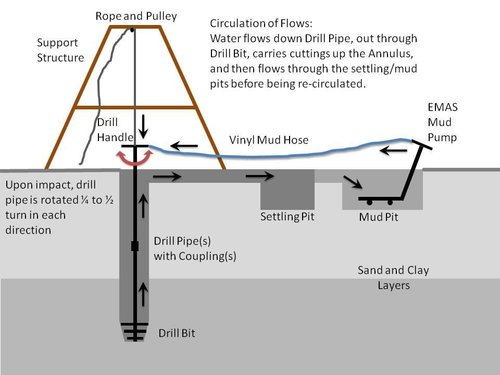THE TECHNIQUE
Walking toward the end of water crisis

1980s. The first wells were performed manually in Yungas, Bolivia
EMAS, Spanish acronym of Mobile School of Water and Sanitation, it is also a group of techniques and concepts related to water and sanitation, developed and implemented for more than 30 years.
The spotlights among them are:

Cistern raised up for rainwater storage

Subterraneous cistern, with shower, sank and solar heater

Odourless ventilated latrine improved
EMAS – Synonym of Sustainability

EMAS has been forged over the years, step by step, learning and adapting to the place where it collaborates, their people, their cultures, their forms of living and life understanding.
Without this social part this technique couldn´t be developed and it allows EMAS to materialize the concept of SUSTAINABILITY.
A practical example, manual hand drilling
A hand drilled system of 30 meter depth including the pump costs about 400 € at Sierra Leona. This amount include both materials cost and the salary payment for 5 people for the 4 days that are necessary (aprox) for install the system. Besides during the development of the well, family members normally help, so they have the learn the technique.

EMAS Hand drilling working scheme
DOCUMENTATION
SUMMARY OF EMAS TECHNOLOGIES
All techniques are documented in different manuals and also with video tutorials. See EMAS Vimeo channel
MANUALS AND STUDIES
EMAS HOUSEHOLD SUPPLY TECHNLOGIES IN BOLIVIA
Evaluation of EMAS sustanibility. By the Rural Water Supply Network
WELHUNGERHILFE and WATERAID
Perspectives and options at Sierra Leone, by Welhungerhilfe y WaterAid





